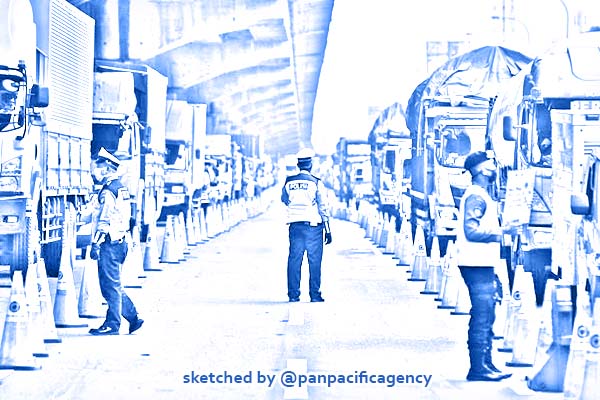Indonesia’s govt sets up checkpoints to monitor people’s mobility between cities, provinces amid ‘mudik’ ban

Police officers monitor vehicles at a checkpoint on the Jakarta-Cikampek toll road in Bekasi regency, West Java, on April 24. (kompas.com/Kristianto Purnomo). Sketched by the Pan Pacific Agency.
JAKARTA, Apr 25, 2020, The Jakarta Post. Regions across Java have set up checkpoints to monitor the flow of vehicles between cities and provinces, following the government’s ban on Idul Fitri mudik (exodus), which started on Friday, The Jakarta Post reported.
The Transportation Ministry has prepared a number of checkpoints in areas surrounding Jakarta, including Tangerang in Banten, as well as Bekasi, Bogor, Sukabumi and Cikampek in West Java, to prevent people from leaving or entering the capital for the annual tradition.
“We are gradually preparing [the checkpoints] on toll roads, national roads, provincial roads, even down to the so-called jalan tikus [alleyways] in districts,” the ministry’s land transportation director general, Budi Setiyadi, said in a press conference on Thursday.
In Tangerang, the ministry has readied a checkpoint at the Bitung toll gate to monitor vehicles heading from Jakarta to Merak, Banten, and vice versa. In Bekasi, a checkpoint has been established in areas bordering Karawang.
The ministry has also prepared a checkpoint at Puncak Pass, a tourist destination bordering Bogor regency and Cianjur in West Java. In Sukabumi, meanwhile, a checkpoint has been set up in Cigombong, the border of Bogor regency and Sukabumi.
A checkpoint has been set up at the 31-kilometer point on the Jakarta-Cikampek toll road on the border of Bekasi and Karawang, where authorities stood by to conduct inspections on vehicles passing the area.
Private vehicles leaving Jakarta for West Java will be asked to make U-turn and return to the capital from West Cikarang.
The checkpoints for land routes will be activated from Friday to May 31, in accordance with Transportation Ministerial Regulation No. 25/2020 regarding transportation use control during this year’s mudik period to prevent wider contagion of COVID-19 in the country.
Under the regulation, the ministry has set restrictions on all passenger vehicles entering and leaving regions that have imposed large-scale social restrictions (PSBB), including Greater Jakarta and Greater Bandung in West Java.
The roads, however, remain open, to accommodate vehicles carrying logistics and essential needs.
Millions of Indonesians return to their hometowns every year – often traveling from urban centers to the countryside – to celebrate Idul Fitri, including those from capital Jakarta, a city where many people have migrated to from around the country in search of work.
With Jakarta being the country’s epicenter of the outbreak, public health experts have warned that mudik could cause the contagious respiratory illness to spread rapidly across Java.
President Joko “Jokowi” Widodo subsequently announced a ban on the Idul Fitri mudik on Tuesday after reviewing a Transportation Ministry survey that said 24 percent of the country’s 270 million people still planned to travel to their hometowns and that 7 percent had already left.
The ministry held a meeting on Thursday with regional heads from Java, Bali and Lampung in Semarang, Central Java, to discuss preparations for monitoring the potential mudik flow.
Central Java Governor Ganjar Pranowo said the province had prepared 83 inter-regency monitoring checkpoints and inter-provincial monitoring checkpoints spread across the region.
“For inter-provincial supervision, there are seven checkpoints, namely at Tegal terminal, Pejagan toll gate, Losari Brebes goods terminal, Wanareja terminal, Pungkruk toll gate, Klonengan Slawi Tegal rest stop and Dukuh Salam terminal,” Ganjar said after the meeting.
The provincial administration will also add three checkpoints in its easternmost regencies as Surabaya and its neighboring regencies, Sidoarjo and Gresik, in East Java would start imposing partial lockdowns on Tuesday.
Ganjar said he was reviewing plans to ensure the social security of people from the region who lived outside the province, especially those in Greater Jakarta, as they could not return to their hometowns due to the mudik ban.
“If [the government] cannot guarantee [their social security], please let us know. We will set up public kitchens in Jakarta to help them,” he said.
Ganjar said he had asked the Transportation Ministry to be flexible with the monitoring at checkpoints. “If there is a violation, just tell them to go back and if they disobey, they are to be quarantined,” he said.
Acting transportation minister Luhut Pandjaitan, who is also the coordinating maritime affairs and investment minister, said regional governments were allowed to improvise and determine how strict they wanted to implement the monitoring, as long as the policy did not contradict the prevailing regulation.
“The [transportation] ministerial regulation was formulated to accommodate but regional leaders are allowed to make adjustments. I have asked the land transportation director general to communicate with Central Java. We want to save lives,” Luhut said.